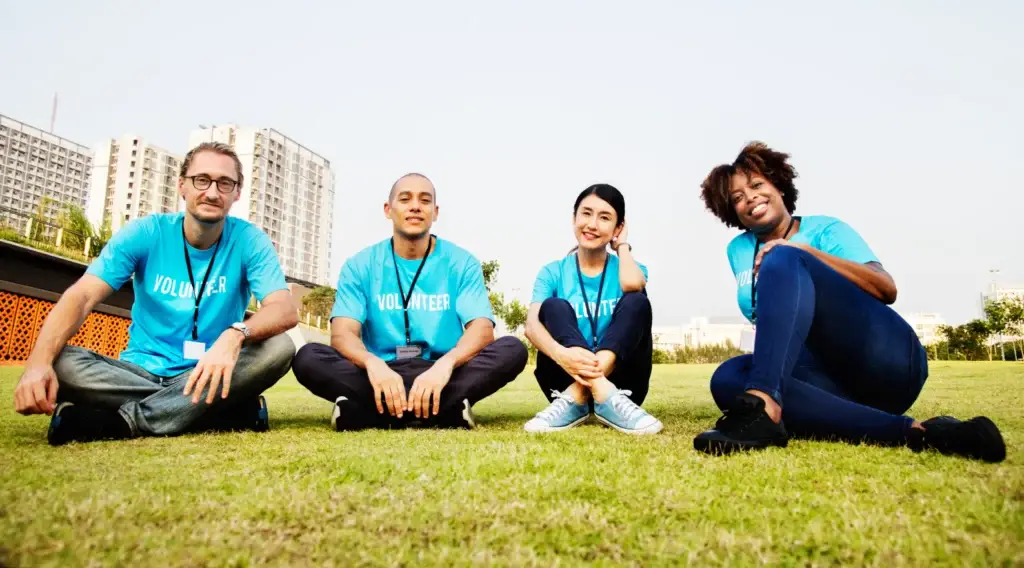How Your HR Team Can Drive Diversity – Part 2
As we discussed and laid out in Part 1 of ‘How Your HR Team Can Drive Diversity’ by leveraging the expertise of your HR team, you can foster an environment where all employees feel valued, respected, and empowered to contribute their best work. We now move to explore in Part 2 some of the top ways your HR teams in Derry Northern Ireland can drive diversity and inclusion in the workplace, helping you to build a more innovative, productive, and successful organization with the following approaches and advice . . .

Create Mentorship Programmes
After establishing a solid foundation for diversity and inclusion, your HR team can take it to the next level by creating mentorship programs that foster growth, learning, and connection among employees from diverse backgrounds.
Career Development Opportunities
On top of providing valuable guidance, mentorship programs can offer career development opportunities that help underrepresented groups break through glass ceilings and reach their full potential. By pairing employees with experienced mentors, you can create a pipeline of diverse talent that’s ready to take on leadership roles.
Mentor and Mentee Pairing Process
An effective mentor-mentee pairing process is crucial to the success of your mentorship program. It’s necessary to consider factors such as shared interests, career goals, and communication styles when matching mentors and mentees.
This process requires careful consideration and planning to ensure that mentors and mentees are well-suited to work together. At Ara Workplace Law, we recommend that your HR team develops a comprehensive pairing process that takes into account the unique needs and goals of each employee. By doing so, you can create meaningful relationships that drive growth, learning, and a stronger sense of community within your organization. By leveraging the expertise of your Team HR, you can create a mentorship program that truly drives diversity and inclusion in the workplace.

Conduct Pay Equity Analysis
After establishing a strong foundation for diversity and inclusion, your HR team can take a crucial step towards ensuring fairness in compensation by conducting a pay equity analysis. This process helps identify and address any wage disparities that may exist within your organization.
Identify Wage Disparities
Assessment of your company’s payroll data is crucial in identifying wage disparities. Analyze salaries by job title, department, and demographic factors such as gender, race, and ethnicity to uncover any patterns of inequality. By doing so, you’ll be able to pinpoint areas where adjustments are needed to ensure equal pay for equal work.
Implement Salary Adjustments
Analysis of the data will reveal areas where salary adjustments are necessary. Adjust salaries accordingly to eliminate any disparities, ensuring that all employees are compensated fairly and without bias.
Salary adjustments can be a complex process, requiring careful consideration of various factors such as job descriptions, performance evaluations, and market rates. As an HR team, it’s imperative to work closely with your organization’s leadership and department managers to ensure a smooth implementation process. At Ara Workplace Law, we recommend involving key stakeholders in the decision-making process to ensure buy-in and minimize potential disruptions. By taking a proactive approach to pay equity, your Team HR can help foster a culture of fairness and equality, ultimately driving business success.
Develop Inclusive Benefits
Once again, your HR Team plays a vital role in creating an inclusive workplace culture by developing benefits that cater to the diverse needs of your employees. At Ara Workplace Law, we emphasize the importance of inclusive benefits in promoting diversity and inclusion in the workplace.
Family-Friendly Policies
One of the most effective ways to support your employees’ diverse family structures is by implementing family-friendly policies. You can offer flexible work arrangements, parental leave, and adoption assistance to create a supportive environment for employees with family responsibilities.
Domestic Partner Benefits
One way to demonstrate your commitment to diversity and inclusion is by providing domestic partner benefits to same-sex couples and unmarried partners. This includes extending health insurance, retirement plans, and other benefits to domestic partners.
The importance of domestic partner benefits cannot be overstated. By offering these benefits, you are sending a clear message that your organization values and respects the diversity of your employees’ relationships. This can lead to increased employee satisfaction, retention, and productivity. As your Team HR at Ara Workplace Law, we recommend that you review your current benefits package to ensure it is inclusive of all employees, regardless of their sexual orientation or marital status.
Encourage Work-Life Balance
Keep in mind that promoting work-life balance is crucial for driving diversity and inclusion in the workplace. When your employees feel supported in their personal and professional lives, they are more likely to be engaged, productive, and committed to your organization.
Flexible Scheduling Options
Fluid scheduling arrangements can help your employees manage their workload and personal responsibilities more effectively. By offering flexible start and end times, compressed workweeks, or telecommuting options, you can demonstrate your commitment to supporting their overall well-being.

Wellness Initiatives
Work life harmony is critical for employee satisfaction and retention. Your HR Team can play a vital role in promoting wellness initiatives that cater to diverse needs and preferences.
The wellness initiatives you implement can include employee assistance programs (EAPs), mental health resources, fitness classes, or on-site meditation rooms. As an expert in employment law, Ara Workplace Law recommends that you consider partnering with wellness providers to offer exclusive discounts or services to your employees. By doing so, you can create a supportive environment that acknowledges the unique challenges faced by your diverse workforce. By leveraging the expertise of your Team HR, you can develop a comprehensive wellness strategy that aligns with your organization’s values and goals, ultimately contributing to a more inclusive and diverse workplace culture. Human Resources plays a critical role in driving this initiative forward, and with the right approach, you can reap the benefits of a happy, healthy, and productive workforce.
Monitor Diversity Metrics
Unlike other initiatives that may seem ambiguous, monitoring diversity metrics provides concrete data to measure the success of your diversity and inclusion efforts. This helps your HR team identify areas that require improvement and track progress over time.
Track Hiring and Promotion
Clearly, tracking hiring and promotion metrics is crucial to understanding the diversity of your workforce. You should monitor the demographics of new hires, promotions, and voluntary turnover to identify potential biases in your recruitment and selection processes. This data will help your HR team develop targeted strategies to attract and retain diverse talent.
Analyze Employee Engagement
You need to understand how different demographic groups within your organization perceive their workplace experience. Analyze employee engagement surveys to identify trends and areas of improvement. This will help your HR team develop initiatives that promote inclusion and address the unique needs of diverse employee groups. Analyze the results of your employee engagement surveys to identify disparities in employee experience. For instance, do employees from underrepresented groups feel less engaged or less likely to recommend your organization as a great place to work? By digging deeper into the data, your HR team can develop targeted initiatives to address these disparities and create a more inclusive workplace culture. At Ara Workplace Law, we recommend that our clients regularly review and analyze their diversity metrics to ensure their HR team is driving meaningful change. By doing so, your Team HR can develop data-driven strategies that promote diversity, equity, and inclusion, ultimately leading to a more productive and successful workforce.
Many organizations recognize the importance of diversity and inclusion, but struggle to make meaningful progress. One key reason is the lack of accountability among leaders. As an HR professional, you know that your organization’s leaders set the tone for the entire company. If they’re not committed to diversity and inclusion, it’s unlikely that the rest of the organization will be either. That’s why it’s imperative to hold leaders accountable for driving diversity and inclusion initiatives.
Diversity and Inclusion Goals
On a regular basis, review your organization’s diversity and inclusion goals with your leaders to ensure they’re aligned with the company’s overall strategy. Make sure these goals are specific, measurable, and achievable, and that they’re communicated clearly to the entire organization. This will help ensure that everyone is working towards the same objectives.
Performance Metrics and Reviews
The success of diversity and inclusion initiatives should be tied to performance metrics and reviews. This means that leaders should be evaluated on their progress towards diversity and inclusion goals, just as they would be for other key performance indicators.
It’s imperative to establish clear metrics for measuring diversity and inclusion progress, such as diversity hiring rates, employee engagement surveys, or training program participation. By tying these metrics to performance reviews, you can ensure that leaders are held accountable for their role in driving diversity and inclusion. At Ara Workplace Law, we’ve seen firsthand how this approach can lead to meaningful change and a more inclusive workplace culture. By working closely with your Team HR, you can develop a comprehensive strategy for holding leaders accountable and driving real progress towards a more diverse and inclusive organization.
Create a Diversity Council
All organizations, regardless of size or industry, can benefit from having a dedicated team focused on promoting diversity and inclusion in the workplace. As your HR Team or Team HR, creating a diversity council is an crucial step in driving meaningful change and fostering a culture of inclusivity.
Employee Representatives
Now, you may be wondering who should be part of this council. Ideally, the diversity council should comprise employee representatives from various departments, levels, and backgrounds. This diverse group will bring unique perspectives and experiences, enabling your organization to tackle a wide range of diversity and inclusion challenges.
Strategic Diversity Initiatives
Initiatives such as unconscious bias training, mentorship programs, and cultural celebrations can help create a more inclusive work environment. By implementing these initiatives, your organization can demonstrate its commitment to diversity and inclusion, attracting top talent and improving employee engagement.
This is where your diversity council can play a vital role. By working closely with your HR Team at Ara Workplace Law, the council can develop and implement strategic diversity initiatives that align with your organization’s goals and values. For instance, the council can identify areas where unconscious bias may be impacting hiring decisions and develop training programs to address these biases. Similarly, the council can establish mentorship programs that pair employees from underrepresented groups with senior leaders, providing valuable career development opportunities.

Provide Mental Health Resources
Not only is promoting diversity and inclusion imperative for creating a positive work environment, but it’s also crucial for supporting the mental well-being of your employees. As an HR team, you have a significant role to play in providing resources that cater to the diverse needs of your workforce.
Employee Assistance Programs
Even the most resilient employees can face personal challenges that affect their performance at work. That’s why implementing an Employee Assistance Program (EAP) is vital. An EAP provides confidential support services, such as counseling, financial planning, and stress management, to help employees navigate difficult situations.
Access to Counselling Services
You’ll want to ensure that your employees have access to professional counseling services that address their unique mental health needs. This may include providing referrals to external counseling services or partnering with mental health organizations that offer on-site counseling sessions. You can take it a step further by educating your employees about the importance of mental health and reducing the stigma associated with seeking help. By doing so, you’ll create a culture where employees feel comfortable discussing their mental health concerns and seeking support when needed. At Ara Workplace Law, we recommend that you, as an HR team, work closely with your organization’s leadership to develop a comprehensive mental health strategy that aligns with your diversity and inclusion goals. By doing so, you’ll not only improve employee well-being but also enhance your organization’s overall performance and reputation.
Implement Flexible Work Arrangements
To create a more inclusive workplace, your HR team can implement flexible work arrangements that cater to diverse needs and lifestyles. At Ara Workplace Law, we recommend exploring various options that promote work-life balance and increase employee satisfaction.
Telecommuting Options
Little things can make a big difference, and offering telecommuting options can be a game-changer for employees who require flexibility. By allowing employees to work from home or remotely, you can attract and retain top talent, reduce turnover rates, and increase productivity. As an HR team, you can establish clear guidelines and protocols for telecommuting to ensure seamless communication and collaboration.
Compressed Workweeks
Similarly, little adjustments to the traditional 9-to-5 schedule can have a significant impact on employee well-being. Compressed workweeks, where employees work longer hours for fewer days, can be an attractive option for those who value extra days off or need to balance family responsibilities.
Work with your team to identify the best compressed workweek schedules that meet business needs while accommodating individual requirements. For instance, you can offer a 4-day workweek with extended hours or a 3-day workweek with regular hours. By doing so, you can demonstrate your commitment to diversity and inclusion, as well as improve overall job satisfaction and engagement. As an HR team, it’s important to communicate the benefits and logistics of compressed workweeks clearly to ensure a smooth transition.
Do not forget, at Ara Workplace Law, we emphasize the importance of flexibility in creating a diverse and inclusive workplace. By implementing flexible work arrangements, your HR team can drive positive change and foster a culture of respect, empathy, and understanding.
Develop Inclusive Job Descriptions
For your HR team to drive diversity and inclusion in the workplace, it’s important to start with inclusive job descriptions. This is the first point of contact between your organization and potential candidates, and it sets the tone for the entire hiring process.
Gender-Neutral Language
Even the most well-intentioned job descriptions can inadvertently deter qualified candidates from applying. Using gender-neutral language is a simple yet effective way to ensure your job descriptions appeal to a broader range of candidates. Avoid using pronouns like “he” or “she” and opt for neutral terms like “the ideal candidate” or “you.”
Avoiding Unconscious Bias
Language matters, and the words you choose can either attract or repel diverse candidates. Avoid using language that may be perceived as exclusive or biased, such as phrases that imply a specific age range or cultural background.
Avoiding unconscious bias in job descriptions requires a thoughtful and intentional approach. You can start by using tools like blind hiring software or working with a diversity and inclusion expert, like Ara Workplace Law, to review your job descriptions for potential biases. By doing so, you can ensure that your job descriptions are free from language that may unintentionally discourage qualified candidates from applying.
Engage with Local Communities
For your HR team to drive diversity and inclusion in the workplace, it’s imperative to engage with local communities. This can be achieved through partnerships with local organizations and community outreach programs.
Partnerships with Local Organizations
Locally-based organizations can provide valuable insights into the needs of diverse communities. By partnering with these organizations, you can gain a better understanding of the challenges faced by underrepresented groups and develop strategies to attract and retain top talent from these communities. As an HR team, you can work with local organizations to develop job training programs, mentorship initiatives, and other activities that promote diversity and inclusion.

Community Outreach Programs
There’s no better way to understand the needs of local communities than by engaging with them directly. Community outreach programs allow your HR team to connect with diverse groups, listen to their concerns, and develop targeted strategies to promote diversity and inclusion.
Engage your community outreach programs to identify opportunities to partner with local schools, community centers, and other organizations that serve diverse populations. For instance, you can develop internship programs for students from underrepresented groups or create mentorship initiatives that pair your employees with individuals from local communities. At Ara Workplace Law, we recommend that you involve your Team HR in these outreach programs to ensure that your diversity and inclusion strategies are aligned with the needs of your local community. By doing so, you can create a more inclusive workplace culture that reflects the diversity of your community.
Create a Sense of Belonging
Now, more than ever, creating a sense of belonging in the workplace is crucial for driving diversity and inclusion. When employees feel like they belong, they are more likely to be engaged, motivated, and productive. Your HR Team plays a vital role in fostering an environment where everyone feels valued, respected, and connected.
Employee Recognition Programs
One effective way to create a sense of belonging is by implementing employee recognition programs. By recognizing and rewarding employees’ achievements and contributions, you demonstrate that their hard work is valued and appreciated. This can be done through employee of the month/quarter/year awards, public recognition, or rewards programs.
At Ara Workplace Law, we recommend that your Team HR develops recognition programs that are fair, transparent, and inclusive, ensuring that all employees have an equal opportunity to be recognized and rewarded.
Inclusive Workplace Culture
Inclusive workplace cultures are built on a foundation of respect, empathy, and understanding. It’s imperative to create an environment where everyone feels comfortable bringing their authentic selves to work.
You can achieve this by promoting open communication, actively listening to employees’ concerns, and addressing any biases or microaggressions that may arise. By doing so, you’ll create a culture where everyone feels valued, respected, and empowered to contribute their unique perspectives and ideas.
By fostering an inclusive workplace culture, your Human Resources team can help break down barriers and create a sense of belonging among all employees. This, in turn, will lead to increased job satisfaction, reduced turnover rates, and improved overall performance.

Conclusion
So, it’s clear that your HR Team plays a vital role in driving diversity and inclusion in the workplace. By implementing strategies such as unconscious bias training, creating employee resource groups, and fostering an open-door policy, your Team HR can create a culture of belonging and respect. At Ara Workplace Law, we understand the importance of a diverse and inclusive workplace, and we’re committed to helping your Human Resources team develop effective strategies to promote equality and fairness. By working together, you can create a workplace where everyone feels valued and empowered to succeed.
Contact us today info@araworkplace.law or click here.
Trusted Experience | Peace of Mind | Stress Free | Immediate Access
By partnering with Ara Workplace Law for HR outsourcing, your company can benefit from their legal expertise, ensuring that your HR practices align with employment laws and minimizing the risk of legal complications.